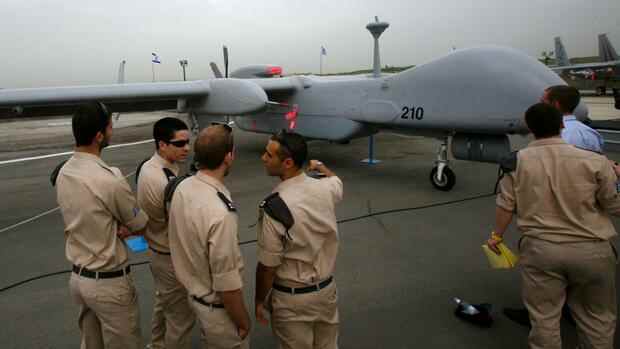Germany wants to acquire armament for drones of this type.
(Photo: Reuters)
Berlin The Liberals primarily want to use the planned 100 billion euro special fund for the Bundeswehr to finance large-volume procurement projects, cross-border armaments cooperation and infrastructure projects. This is what it says in a position paper that the defense working group of the FDP parliamentary group decided on and that is available to the Handelsblatt.
The list of priorities contained therein already totals 102 billion euros and would thus exceed the planned volume of the special fund. Additional expenses for the maintenance of materials and spare parts, ammunition or the personal equipment of the soldiers would then have to be financed from the regular defense budget.
The Liberals are pursuing a clear goal, as the defense policy spokesman for the FDP parliamentary group, Marcus Faber, said: “We have to make the Bundeswehr cold start capable again.” It must be able to react to large-scale threats even at short notice. “We’re a long way from that at the moment.”
The working group formulated twelve demands for the use of the special fund in order to close major capability gaps in the Bundeswehr. Procurement projects such as a heavy transport helicopter as a successor to the Sikorski CH-53G or a new air defense system should have priority.
Top jobs of the day
Find the best jobs now and
be notified by email.
The FDP wants to focus on the army, since the air force and navy have already received above-average consideration in past defense budgets. With the exception of the combat aircraft of the future (FCAS) and the tank of the next generation (MGCS), which Germany wants to develop together with France, no research and development projects are to be financed from the special fund, only market-ready technology.
The Liberals assume that 140 billion euros will be available for investments in the Bundeswehr over the entire legislative period, because 20 percent of the regular budget of currently around 50 billion euros is to be reserved for investment measures.
“We have to make the Bundeswehr cold start capable again.”
(Photo: dpa)
The FDP defense experts put the costs for large-volume procurement projects and infrastructure measures such as the data center network or the energetic renovation of properties at a total of 68 billion euros. This includes projects such as the heavy transport helicopter, the F-35 fighter jet to replace the Tornado, the further development of the Eurofighter, several air defense systems and new warships.
The FDP defense experts estimate 34 billion euros for multinational armaments cooperation such as the Franco-German FCAS combat aircraft, the F127 frigate developed jointly with the Netherlands or the submarine project with Norway.
In addition, according to their calculations, 20 to 25 billion euros for ammunition, 4.5 billion euros for spare parts and at least four billion euros for operational clothing and equipment for the soldiers.
>> Read here: Five corvettes, 50 fighter jets, 350 Puma tanks – how Germany is arming itself
Meanwhile, the federal government is accelerating the rearmament of the Bundeswehr. On Wednesday, the defense committee cleared the way for a long-controversial armaments project, and the budget committee was supposed to approve it in the afternoon. According to this, Germany will order armament from Israel for the Heron TP drone from Israeli production. Including the additional equipment such as simulators and support for weapons training, the order volume amounts to around 153 million euros.
In the grand coalition, the SPD was still against arming drones. Now the traffic light coalition is laying down conditions for use in a so-called stipulations – for example, that the use of drones in foreign missions must be expressly mentioned in the Bundestag mandate or that they should be controlled from the area of operation if possible.
The budget spokesman for the Union parliamentary group, Christian Haase (CDU), sees this as an “incapacitation of the Bundeswehr”. The fact that the traffic light wants to set strict limits on the use of drones shows “how little trust the coalition has in the abilities and skills of our soldiers”.
More: The EU is laying the groundwork for a defense union – but the path to get there is rocky
